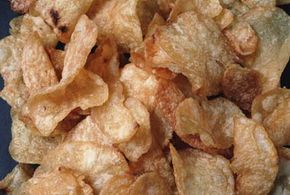You can also treat the nausea and vomiting of morning sickness with food and other items from your kitchen. For more on these home remedies, read on.
Home Remedies From the Cupboard
Crackers. Crackers are a pregnant woman's prize possession (food-wise). They are portable, easy to digest, and inexpensive, and in many cases, they nip nausea in the bud. Plain, whole-wheat crackers, pretzels, plain popcorn, or low-salt soda crackers are your best bets. Nibble on them throughout the day and before going to bed. If morning sickness hits full force in the A.M., feed your mouth before your feet touch the cold floor. Better yet, stay in bed nibbling on crackers for several minutes. Sudden transitions from the horizontal to the vertical often trigger nausea, so go easy in the morning.
Potato chips. Perhaps pregnancy is the only time in a woman's life when potato chips offer a cure...and can be consumed without guilt. For many women, munching on a few chips (note the word "few") at the first sign of nausea helps dissipate it. If this cure is for you, stick to regular potato chips and stay away from the fat-free varieties that contain Olestra, the fat substitute. Olestra robs yours body of important nutrients, and it is known to cause diarrhea.
Sometimes pregnancy brings about an over-production of saliva, which can make the mother-to-be sick to her stomach. Nibbling on a handful of salt-and-vinegar chips helps dry up the saliva.
As with any junk food, don't pig out on chips, even if they are a cure. Nibble only when needed. Some women in fact may find this remedy distasteful since fat is hard to digest and can cause increased stomach upset.
Nuts and peanut butter. High-protein foods like nuts, peanut butter, and dairy products may help ease morning sickness.
Home Remedies From the Refrigerator
Citrus fruit. A small slice of lemon, lime, or orange added to your water or herbal tea can help ease nausea.
Fruits and vegetables. Water consumption is very important during pregnancy, but all your water doesn't have to come from the tap. Foods high in water content work double time at preventing dehydration and its partner constipation, both of which aggravate nausea. Try snacking on melons, carrots, celery, grapes, apples, pears, and frozen fruit bars.
Home Remedies From the Sink
Water. Dehydration can bring about nausea. Expectant mothers must drink 8 glasses of water a day.
Home Remedies From the Spice Rack
Fennel. Fennel seed is a nausea remedy from Chinese folk medicine. As with mint, fennel seed contains anesthetic constituents that may reduce queasiness. Crush 1 tablespoon fennel seeds into a coffee grinder. Place the crushed seeds in a cup and fill with boiling water. Cover and let steep for ten minutes. Drink the tea in sips to treat nausea.
Ginger. Ginger has a well-established track record as a morning sickness remedy, especially in the folk medicine of New England and the Pacific Northwest. The root of this plant contains chemicals called gingerols and shogaols that relax the intestinal tract, relieving nausea and vomiting. The easiest way to get your ginger is through real ginger ale (non-caffeinated) or ginger tea. For the tea, place 1/2 teaspoon powdered ginger spice into a cup and fill with boiling water. Cover and let stand ten minutes. Strain and sip. Don't take more than three times daily. If needed, sweeten with just a little honey. You can also try ginger candy.
Warning! Some experts frown upon using ginger during pregnancy but others say it is OK. Should you have any doubts, consult your doctor.
Lavender and thyme. Smells become more pronounced during pregnancy. Odors that didn't bother you before, like dirty laundry, can now have you reaching for a bucket. Battle smells of any sort by arming yourself with a small satchel stuffed with dried herbs. Lavender and thyme are particularly appealing since both have soothing reputations. A handkerchief scented with fresh-squeezed lemon also makes a handy remedy. Keep the satchel or hanky near the nose and breathe in deeply when odors turn your stomach sour.
Mint. The anesthetic constituents in mint work to minimize nausea by reducing the stomach's gag reflex. Make a cup of mint tea any time you feel a wave of nausea about to crash ashore. Place 1 tablespoon mint leaves in a 1-pint jar of boiling water. Let stand 20 to 30 minutes, shaking occasionally. Strain and sip as needed.
Home Remedies from the Supplement Shelf
Vitamin B6. A number of physicians recommend taking a supplement of this vitamin -- the usual dose is 10 to 25 milligrams three times a day -- to combat the nausea of morning sickness. Talk to your doctor before trying a supplement, however, and be sure not to exceed 75 milligrams of the vitamin each day.
Luckily, relief from morning sickness is just a few months away, since symptoms typically subside after the first trimester. In the meantime, you don't need to sit and suffer. Try these handy home remedies the next time nausea strikes.
For more information about pregnancy and related topics, try the following links:
David J. Hufford, Ph.D., is university professor and chair of the Medical Humanities Department at Pennsylvania State University's College of Medicine. He also is a professor in the departments of Neural and Behavioral Sciences and Family and Community Medicine. Dr. Hufford serves on the editorial boards of several journals, including Alternative Therapies in Health & Medicine and Explore.
This information is solely for informational purposes. IT IS NOT INTENDED TO PROVIDE MEDICAL ADVICE. Neither the Editors of Consumer Guide (R), Publications International, Ltd., the author nor publisher take responsibility for any possible consequences from any treatment, procedure, exercise, dietary modification, action or application of medication which results from reading or following the information contained in this information. The publication of this information does not constitute the practice of medicine, and this information does not replace the advice of your physician or other health care provider. Before undertaking any course of treatment, the reader must seek the advice of their physician or other health care provider.

